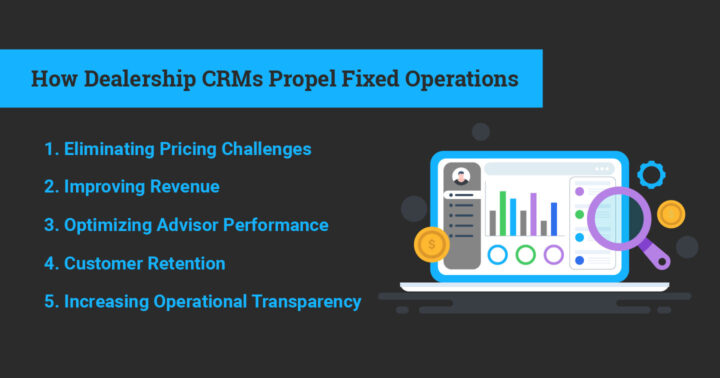Successful automotive dealerships thrive on efficient processes, strong customer relationships, and data-driven decisions. Achieving this balance can be challenging without the right tools. A Dealership Customer Relationship Management (CRM) system is one of the most powerful resources available to modern dealerships, particularly in supporting Fixed Operations. But what exactly is a dealership CRM, and how can it optimize your service department?
Before we dive in, it’s crucial to acknowledge that dealership software and the best dealer management systems often work together with CRM platforms to create a streamlined dealership workflow. Understanding this interconnectedness can help dealerships leverage the right technology for success.
What is a CRM in Automotive and How Does it Work in a Dealership?
A Customer Relationship Management (CRM) system in the automotive industry is a software solution designed to manage interactions and relationships with both potential and existing customers. Its primary focus is to improve customer retention, sales efficiency, and operational productivity.
When applied to the automotive sector, CRM automotive systems cater specifically to dealership needs, including sales, service scheduling, parts tracking, and follow-ups. This tailored approach allows dealerships to optimize their Fixed Operations, ensuring consistent workflow while enhancing the overall customer experience.
Digging deeper, CRMs in a dealership consolidate all customer-related data, whether it’s for sales, service, or post-sale relationships, into a single, accessible platform. For Fixed Operations, CRMs enable service managers and advisors to streamline processes, such as appointment setting, managing service reminders, and boosting service retention rates. By automating these tasks, CRMs reduce manual administrative burdens, allowing teams to focus more on customer service and business growth.
Fixed Operations departments rely on ongoing, positive customer relationships to keep the service drive busy and profitable. Automated notifications, personalized follow-up emails, and actionable data insights generated by the CRM directly contribute to higher service retention. Advisors can spot upselling opportunities for additional services like detailing, tire rotation, or seasonal maintenance packages. This holistic view enriches the customer experience and drives incremental revenue.
What CRM Do Dealerships Use?
There isn’t a single solution that fits every dealership. Instead, dealerships often seek out the best CRM tailored to their specific needs. Leading tools focus on scalability, integration with other systems, and the delivery of actionable insights.
While larger operations may rely on comprehensive CRMs that integrate with dealership management systems (DMS), smaller operations may opt for more lightweight solutions to manage their customer interactions. Either way, the key is selecting software that delivers measurable improvements in customer satisfaction and operational efficiency.
CRM Software Examples
There are numerous CRM softwares available in the market. Whether it’s a tool that excels in automating marketing campaigns or managing inventory, the critical element is its ability to support Fixed Operations. Successful tools reduce manual processes, enhance profitability by encouraging repeat business, and foster a customer-first experience. Automotive CRM software can even help track and rectify service department inefficiencies while providing managers with actionable data to fuel smarter decisions.

How Dealership CRMs Propel Fixed Operations
Dealership CRMs support Fixed Operations in several key ways:
- Eliminating Pricing Challenges: Correctly assessing the “perfect price” for services is no easy feat. With tools like Dynatron Software’s PriceSmart, dealerships structure service and parts pricing to remain competitive while hitting profitability targets.
- Improving Revenue: Fixed Operations fuel dealership profitability, and CRMs help identify gaps that may hinder revenue generation. For example, warranty labor and parts filing protocols powered by accurate data prevent unnoticed revenue losses.
- Optimizing Advisor Performance: A CRM not only automates processes, but also ensures that service advisors are trained and supervised effectively, eliminating bad habits that can affect service quality. This increased oversight boosts productivity and enhances revenue potential.
- Customer Retention: Building strong customer relationships with timely communication and personalized experiences keeps customers coming back for service appointments, driving both customer satisfaction and steady revenue.
- Increasing Operational Transparency: With dashboards and reporting tools, CRMs provide real-time insights, making it easier for managers to identify trends, set benchmarks, and continuously fine-tune operations.
Take Your Dealership to the Next Level
At Dynatron, our proven data and analytics, powered by our Repair Order Insights (ROI) platform, combined with the expertise of seasoned Coaches, unlocks your Fixed Operations’ revenue potential. PriceSmart can boost your CP ELR significantly, generating an average of $250K in additional annualized revenue in the first year.
Schedule a demo today to see how our dealership CRM solutions can work for you.